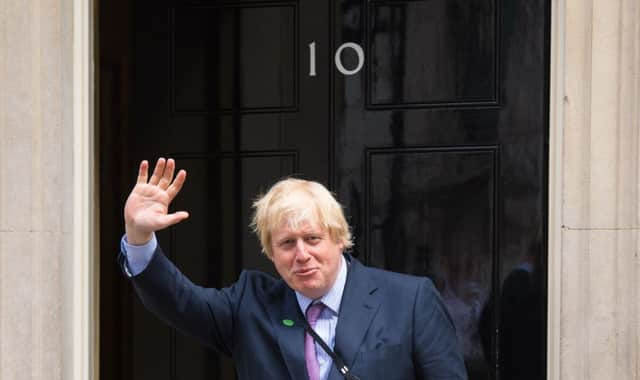Political cabinet role for Boris Johnson


Mr Cameron made clear that the nature of the appointment was dictated by the need for Mr Johnson to continue concentrating on his responsibilities as mayor of London until the end of his term in May 2016.
But there is little doubt in Westminster that the newly-elected MP for Uxbridge and South Ruislip will be elevated to the Cabinet in a reshuffle soon after that date.
Advertisement
Hide AdAdvertisement
Hide AdWidely touted as a successor to Mr Cameron when he steps down as Conservative leader before the next general election, Mr Johnson’s appointment is a signal that the Prime Minister wants potential rivals close to him within the Government structure, rather than building alternative power-bases on the backbenches.
He has long professed to be eager to have Mr Johnson back in Parliament, saying he wants “my star players on the pitch”.
Announcing the mayor’s appointment, Mr Cameron said: “Boris Johnson will be attending my political cabinet. As promised, he will devote his attention to his final year as mayor of London.”
The mayor’s official spokesman said: “The mayor has always been clear - he has to fulfil his mandate running London first - and that’s exactly what he will be doing until his term ends in May 2016.”
Political cabinet is an opportunity for the Prime Minister and his senior colleagues to discuss party political matters in a formal context. Meetings generally take place in the Cabinet Room at 10 Downing Street - often immediately after a full Cabinet session - but civil servants are not present and conclusions are not minuted. During the coalition, it was a mechanism by which Tory and Liberal Democrat ministers could meet separately.
Unlike the regular weekly full Cabinet, political cabinets have tended to occur on an irregular basis as and when issues needed discussing, though it is understood Mr Johnson expects to be attending fortnightly.
His involvement at the heart of Mr Cameron’s political machine raises the potential for future clashes over proposals for the expansion of Heathrow, as the mayor has long been firmly opposed to the construction of a third runway. The Airports Commission chaired by Sir Howard Davies is due to report to the Prime Minister in the summer on the expansion of capacity in the South East, with Heathrow a front-runner for investment.
Mr Johnson’s appointment to political cabinet only also raises the question of how he might eventually be accommodated in Mr Cameron’s top team once he leaves City Hall - whether as a replacement for one of the departmental ministers being appointed today or in a newly-created role, such as minister without portfolio, which can be added to the full Cabinet without the need for anyone to be sacked.
Advertisement
Hide AdAdvertisement
Hide AdThe Eton-educated former journalist held only junior shadow ministerial posts in his previous stint in Parliament as MP for Henley from 2001-08, serving as shadow arts minister under Michael Howard and shadow higher education minister during Mr Cameron’s time as leader of the opposition.
He was sacked from the Tory frontbench by Mr Howard in 2005 after it emerged he had been having an affair with Petronella Wyatt, a columnist for the Spectator, which he was then editing.
Mr Johnson saw his political star and public profile rise, in Britain and abroad, during his seven-year absence from the Commons and cemented his position as a frontrunner to succeed Mr Cameron for the Conservative leadership.
But he has never been far from controversy, or been afraid to speak his mind regardless of the consequences - most recently causing a furore when he described the possibility of a Labour minority government backed by the SNP as “Ajockalypse Now”.
Whether it is getting stuck in mid-air on a zip-line with a Union flag in each hand during the London Olympics, claiming table tennis was originally called “wiff waff”, quoting Latin, or his unruly mop of hair, he provides a spark in the increasingly bland British political landscape.
Describing himself as a “one-man melting pot’’ of English, French, Turkish, Muslim, Jewish and German ancestry, Mr Johnson worked as a journalist for The Times and the Daily Telegraph after leaving Oxford University, where he was president of the Oxford Union and - famously - a member of the Bullingdon Club with Mr Cameron.